How to Write a Great Postdoc Cover Letter
While a good cover letter makes an explicit connection between how your past experience will help you succeed in the postdoc position, a great cover letter sparks the PI’s interest and ensures they read your CV. Here are some tips to make sure your cover letter is a great one.
Before you start writing, learn as much as you can about the position and the lab. Do some research on the department’s website and talk to your mentors about the group. It’s also a good idea to take a look at their recent papers to familiarize yourself with the kind of work they do. Once you have a good understanding of the position and group, you can determine which of your qualifications would be most applicable. Be sure to emphasize them in your cover letter.
The Cover Letter Format
A cover letter starts like a formal letter with the date at the top followed by the name and work address of the job poster. This is followed by the salutation. For a postdoc position, you will often be addressing your letter to the PI. However, if it is not clear from the advertisement who the job poster is, you can always address the letter to “members of the search committee).
The Introduction
The opening paragraph should explain why you are writing this letter. Indicate the specific position you are applying for and where you saw it advertised. If another professor at the university or someone the PI knows suggested that you apply for the position, mention it here. Follow it up with a short description of yourself that will allow the reader to place you academically. This could be something like “I am in the final year of my PhD in (field) at (name of university) and will be graduating/defending/finishing in (month). My dissertation is titled (title) and is supervised by Professor (name)”.
The Body Paragraphs
The bulk of your cover letter will be spent demonstrating how you are the right candidate for this postdoc by highlighting your qualifications and showing how they will benefit this specific project. One of the biggest mistakes you make is not tailoring this section to each position you apply for.
In a postdoc cover letter, it is common to dedicate one paragraph to your dissertation or current research project. Summarize your research topic, your key findings or arguments and why they matter to the field.
Now, this next step is important: you must translate your dissertation and previous research to the postdoc project. What expertise will you bring to the project by virtue of your past research that no one else can? Give specific examples that show you understand the proposed projects. Work in reference to you major awards and accomplishments while doing so. Depending on the requirements of the position, it might also be relevant to discuss your teaching experience here. Remember, the theme throughout the body paragraphs should be how your research experience will make this postdoc project successful.
The Final Paragraph
This last paragraph covers some job applicant formalities. In it, you should write that you have attached your CV and other necessary documents in your application. Mention that you look forward to hearing from them and are available to discuss the position further in an interview. Finally, thank them for their consideration before signing off.
Get Feedback
Once you have written your postdoc cover letter, ask your supervisor or a mentor to review it for you. They are likely to have had some experience hiring and will be able to make valuable suggestions from the other side of the table. They can also check that your cover letter is formatted according to the conventions of your field.

Discover related jobs
Discover similar employers
Accelerate your academic career
Practical Advice for Moving to Germany to Study or Research
Everything you need to know about moving to Germany to research or study...
Find Work-Life Balance in Grad School
A good work-life balance contributes to your overall mental and physical...
How to Write a PhD Elevator Pitch
How many times have you been asked, “What do you research?” only to draw...
5 Reasons to Work at the University of Jyväskylä
The University of Jyväskylä is one of Finland’s top academic institution...
How to Write a Professional Academic CV
No matter what stage you are at in your academic career, having an acade...
10 Benefits of an Academic Career
There are many compelling reasons to choose a career in academia. Here a...
Jobs by field
- Machine Learning 180
- Artificial Intelligence 177
- Electrical Engineering 172
- Programming Languages 132
- Molecular Biology 122
- Materials Chemistry 102
- Materials Engineering 101
- Management 98
- Cell Biology 97
- Engineering Physics 95
Jobs by type
- Postdoc 315
- Assistant / Associate Professor 216
- Professor 135
- Researcher 110
- Research assistant 98
- Lecturer / Senior Lecturer 90
- Tenure Track 79
- Management / Leadership 67
- Engineer 55
Jobs by country
- Belgium 294
- Netherlands 204
- Germany 106
- Finland 101
- Switzerland 96
- Luxembourg 53
Jobs by employer
- KU Leuven 97
- Mohammed VI Polytechnic Unive... 94
- Ghent University 68
- Eindhoven University of Techn... 65
- University of Twente 57
- KTH Royal Institute of Techno... 55
- University of Luxembourg 51
- ETH Zürich 41
- Wenzhou-Kean University 35
This website uses cookies
How to write a killer cover letter for a postdoctoral application
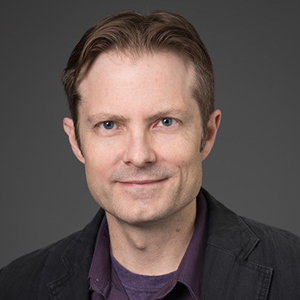
Many graduate students applying for their first postdoctoral positions underestimate the importance of the cover letter. While it may be true that your awesomeness is beautifully outlined on your curriculum vitae, your cover letter often will dictate whether the busy principal investigator puts your application at the top of the heaping pile or into triage.
First impressions are everything for some people, so leave nothing to chance. If you provide only your CV, you aren’t being very personable, and you lose a precious opportunity to highlight some things that make you stand out. On the other hand, a cover letter is also an opportunity to shoot yourself in the foot, so here are a few do’s and don’ts.
A few do's
Start off right. Address your potential future PI properly, as “Dr. (insert surname here).” If you begin your letter with “Dear Sir/Madam” or “To Whom It May Concern,” your application could be dismissed as generic and untailored for the position. A letter that appears to come off an assembly line is likely to ride directly into the trash bin. If you do not invest the time to learn about the PI and his or her research, then the PI is not likely to invest the time to read your application.
After the salutation, the first statement should be a formality that states why you are writing to the PI. It is important to respect how hectic a day in the life of a PI can be, so get right to the point — something like, “I am applying for the postdoctoral position available in your laboratory that was recently advertised (where).”
The second sentence should specify your current position, place of work and mentor. If you are not immediately available for hire, it is useful to mention when you will be able to start. End the first paragraph with just one or two concise sentences that hint at why you are the ideal candidate for the position — you will expand on these points next.
In the second paragraph, elaborate on why you should be considered for the postdoc — not just any postdoc, mind you, but this particular postdoc in this particular lab. Yes, it is infinitely easier to use the same cover letter for the dozens of postdoctoral positions for which you are applying, but that is not going to cut it. These uniform letters are easy to detect and usually dismissed as lazy and insincere. If you fail to convince the PI that you are taking the postdoc search seriously, then the PI is not likely to take you seriously. It is essential that you customize your letter, emphasizing how your background is aligned to the PI’s studies and the specifics called for in the advertisement. Consider this the first demonstration to your future PI that you are resourceful and thoughtful — if you fail to do your homework, it does not build confidence that you will be diligent with your project. Equally important to convincing the PI that you have the right stuff is conveying your excitement for learning something special that is studied by his or her lab. Strive to balance what you would give to the lab and what you would gain from it.
In paragraph three, it is time to brag about a few key achievements, such as your most important paper or two, a grant or fellowship, or other notable honors (an award-winning presentation at a conference, for example). You also can briefly mention that you have experience training more junior people if that is the case. But don’t give a laundry list of every minor award — that is why you submit a CV. The cover letter is the trailer, and your CV is the movie.
End your cover letter with the same professionalism you used at the opening. Thank the PI for his or her time and consideration. Be sure to provide your contact information and state that you look forward to hearing from him or her. Everything discussed above should fit onto a single page — 1 ½ pages at most.
A few don'ts
There are a number of important don’ts that apply to cover letters. Things that might seem trivial to you actually can be turnoffs. Use plain email stationary free of distracting backgrounds or pictures. Choose a font that is not too big, not too small, not in color, definitely not comic sans and NOT IN CAPS. A plain, boring font like 12-point Arial or Helvetica is easy on the sore eyes of a PI struggling to read the 87th postdoc application. At midnight. After struggling with an online manuscript submission. I can hear the chorus of nonconformists arguing that unconventional fonts and graphics make their applications stand out. Of course it does, but I contend that it is a gamble to present yourself in this manner. If you have the goods, you don’t need the glam.
Some applicants waste valuable sentences describing how they “deeply admire” the “esteemed” laboratory or how they always dreamed about working with the PI. When the cover letter is heavy on flattery, the applicant usually is light on talent or productivity. If your cover letter contains significant blocks of text copied straight from the advertisement, you may be construed as someone with poor language skills or unable to paraphrase. It should go without saying that spelling and grammatical mistakes are inexcusable and often taken as a sign of laziness and carelessness — two of the worst attributes a scientist could possess. Finally, avoid slang and attempts at humor, and do not end your sentences with an exclamation point!
I hope these tips help you land that perfect postdoctoral position.
Enjoy reading ASBMB Today?
Become a member to receive the print edition monthly and the digital edition weekly.
Bill Sullivan is a professor at Indiana University School of Medicine and the author of several books.
Related articles
Featured jobs.
from the ASBMB career center
Get the latest from ASBMB Today
Enter your email address, and we’ll send you a weekly email with recent articles, interviews and more.
Latest in Careers
Careers highlights or most popular articles.

A look into medical writing
Our careers columnist spoke with Ashlea A. Morgan at Chameleon Communications International to get a sense of one type of work a medical writer can do.
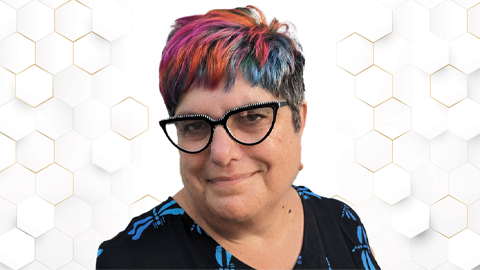
Embracing serendipity
NIGMS Deputy Director Dorit Zuk describes her scientific journey and offers tips on making career changes.

Industry partnership opportunities
The deadlines for these are in April and May.

Catalyzing change and redefining purpose
To mark Women’s History Month, Sudha Sharma writes about her journey from focusing on her own research program to being part of a collaborative COVID-19 project.

The power of sabbaticals
To mark Women’s History Month, Nicholas Rhind writes about learning techniques in other researchers’ labs that empower the work in his own.

Pursuing the call to change
To mark Women’s History Month, Karlett Parra writes about her journey from wanting to be a researcher to becoming a department chair.

Clinical psychology
- Anxiety disorders
- Feeding and eating disorders
- Mood disorders
- Neuro-developmental disorders
- Personality disorders
- Affirmations
- Cover Letters
- Relationships
- Resignation & Leave letters
Psychotherapy
Personality.
Table of Contents
Cover letter for a postdoc (5 samples)
As a BetterHelp affiliate, we may receive compensation from BetterHelp if you purchase products or services through the links provided.
The Optimistminds editorial team is made up of psychologists, psychiatrists and mental health professionals. Each article is written by a team member with exposure to and experience in the subject matter. The article then gets reviewed by a more senior editorial member. This is someone with extensive knowledge of the subject matter and highly cited published material.
This blog post will show samples of “cover letters for a postdoc.”
Samples of postdoc cover letters
To get a postdoc position, you need a well-written cover letter that showcases your passion for and dedication to the industry. When writing a postdoc cover letter, these are some of the essential things to include in your letter:
- Address the employer with a formal salutation. For example, “Dear/Hello (name of the recipient or hiring manager).”
- The next step is to state the position you are applying for and how you found the opening.
- Write a short sentence about why you’re interested in the position.
- State your skills and work experience; ensure they are similar to the job position. When stating your skills, provide the accomplishment you have achieved.
- Conclude your letter with a forward-looking statement. For example, “I look forward to discussing the position further.”
“01/06/2021
Dr. Harold Bergman
Enteny University
113 Sunnyside Circle
Enteny, Illinois, 60002
Dear Dr. Bergman,
I am writing to express my sincere interest in Enteny University’s open postdoc laboratory position. I would love to pursue my postdoctoral studies as a member of your team. I am a recent graduate of Bertrum University where I gave my presentation on hydrogen fuel cell viability. You may remember Juan Sosa mentioning my interest in your laboratory at the end of the last school year.
In my research, I focused on developing hydrogen fuel cell delivery and storage solutions focusing specifically on portable applications for military use. In my doctoral studies, I worked to develop charging and backup systems for portable electronic devices (PEDs). Current military operations cannot effectively use fuel alternatives because emergency and frequent charging solutions remain unavailable. Most of my work has revolved around alternative energy-harnessing systems and long-lasting batteries. In my work, I produced fuel cells less susceptible to environmental degradation factors and extreme temperatures. I look forward to continuing my research and working toward miniaturizing fuel cells to improve their PED compatibility as a member of your research team.
I would appreciate the opportunity to continue my research in your laboratory and pursue a long-term future with Enteny University. I believe the nature of my research relates to your lab because, as the leading institution in fuel cell research, my chosen field of study is extremely relevant to your efforts. I think my knowledge and experience surrounding PEDs and battery longevity could aid in your research.
I am a self-motivated, independent researcher with eight years of experience. As a detail-oriented, qualified and creative candidate, I feel my fuel-cell research, grant proposal writing and tutoring experience could be a major asset to your laboratory. I’ve attached my CV and would be very interested in setting up a time to further discuss my skills and qualifications with you. Please let me know if you have questions and I look forward to hearing from you.
Harriet Browne”
“[Today’s Date]
[Hiring Manager’s Name]
[123 Company Address]
[Company City, State xxxxx]
[(xxx)-xxx-xxxx]
Dear [Dr./Mr./Ms./Mx.] [Hiring Manager’s Last Name],
I am writing to express my interest in a postdoctoral position in your lab. I am a PhD Candidate in the Andrew Dwyer lab at James Hill University expecting to graduate in June 2022. My graduate work, published in Science this year, investigated the RNA virome in various aquatic environments using metagenomic analysis. My future research goals are to apply my computational skills and develop my skills working with non-human primate models to better understand and design therapeutics against pathogenic viruses. I believe my strong background in virus biology, library preparation, and next-generation sequencing analysis make me an ideal candidate to study respiratory disease viruses in your lab.
In my thesis lab, we use viral evolution to find trends that unite eukaryotic disease viruses. However, our current picture of RNA virus taxonomy is still incomplete, with the five-clade organization largely informed by human and agricultural animal and plant studies.
Therefore, to refine and complete our understanding of the global RNA virome, I sampled multiple complex aquatic environments and performed metagenome analysis. Confirming that the five-phyla classification based on RdRP sequence comparisons holds true, my analysis nearly tripled the number of currently known RNA viruses.
Host assignments proved to be tricky during my thesis. But I tackled this problem through various methods, including developing machine learning algorithms and comparing RNA viruses to size-separated microbial preparations subjected to DNA and RNA sequencing. I am continuing to characterize the novel and more highly divergent RdRPs discovered by our sampling. Also I mentor one graduate and one undergraduate student with their independent projects drawn from my work.
While I have focused primarily on RNA virus ecology and evolution during my graduate work, I am comfortable extending my research to studying RNA viruses in human disease. I collaborated with Dr. Henry Fields on a publication, currently under review at Frontiers in Immunology, studying rhesus macaque responses to MERS-CoV. The skills I learned through our collaboration, as well as from electives and literature search in immunology and human virology, have prepared me well to transition from studying viruses to studying virus-host interactions. Additionally, I look forward to applying my computational skills toward single-cell sequencing analysis examining the effects of age, diet fat content, and viral strain on primate responses to SARS-CoV-2 challenges, building on the methods and results in your recent Cell Reports Medicine paper. I would greatly appreciate the opportunity to talk with you more about my fit in your lab. Thank you for your time and consideration.
“Anshu Mahajan
Ph.D. in Biochemistry and Molecular Biology
+91 84 90184020
linkedin.com/in/anshu.mahajan
Pondicherry, 10.01.2022
Kajol Samra
Head of the Department of Biochemistry & Molecular Biology
Pondicherry University
Chinna Kalapet
Kalapet, Puducherry
Dear Ms. Samra,
As an alumnus of Pondicherry University, I was thrilled to learn about the Post-Doctoral Fellow position available at the Department of Biochemistry & Molecular Biology. During my PhD studies at Pondicherry University, I researched the relationship between circadian regulation and neurodegenerative diseases and wrote my doctoral thesis “Circadian activity and memory performance in Alzheimer’s patients” under the supervision of professor Qadim Ray. Seeing that Pondicherry University hopes to move to the forefront of neurodegenerative disease research with a new team led by professor Abbas Sengupta, I believe that my analytical skills and academic experience could be a great asset to this programme.
The fellowship offer mentions you’re looking for candidates skilled in the areas of lab management, cytometry for apoptosis detection, and data collection. I am happy to say that I possess all of those qualities:
- Lab management: During my PhD research, I collaborated with fellow doctoral students to create a lab maintenance plan, which included up-to-date information on equipment booking, planned activities, instrument inventory, scheduling details, and a list of consumables and chemical supplies for restocking. By implementing this system, we were able to reduce the instances of conflicting activities by 67% within two months, and we maintained a stock of consumables and chemical supplies 88% of the time.
- Cytometry for apoptosis detection: I am familiar with various methods of apoptosis detection, having conducted flow cytometry to detect changes appearing in organelles, monitor activation of caspase 3, oversee changes to the plasma membrane, and changes in the nuclear DNA, using cells at a concentration of 1×106 cells/ml.
- Data collection: For my doctoral thesis, I have conducted 74 detailed interviews with Alzheimer’s patients, covering their current memory-related symptoms, overall health, family history, and sleeping habits. I have compared this information with data gathered using sleep trackers that collected information about sleep cycles. Instead of paper copies, I have used Excel spreadsheets and Cloud solutions for storing information, which helped to speed up the process of pulling up specific data by 89%.
What makes me particularly interested in your post-doctorate fellowship program is the chance to continue my research. Having worked with Alzheimer’s patients, I have seen first-hand how this disease influences the quality of life of not just the patients themselves, but also their loved ones. I believe that working together with other researchers under the guidance of professor Abbas Sengupta can lead to significant discoveries in the nature of neurodegenerative diseases. Recently, I have observed how another team of researchers at Pondicherry University achieved a major breakthrough in the study of endosome function and dysfunction. I believe that professor Sengupta’s team can replicate this success and lead to a better understanding of diseases that afflict over 50 million people worldwide.
I can’t wait to discuss my ideas for managing data gathered by professor Sengupta’s team and for introducing changes to laboratory procedures to create a smooth workflow. Could we schedule a meeting next week to discuss how my research experience can contribute to this project?
Anshu Mahajan
linkedin.com/in/anshu.mahajan”
“Dear Professor Knightly,
Having completed my doctorate in Slavonic Studies last semester, I am applying to continue my Postdoc research in the area of the Old Church Slavonic language.
Researching the homeland and language of the Slavs has always been a passion and I have undertaken many translation projects that have contributed to the modern understanding of how language influenced the early Slavonic church in the Moravian Empire.
I will be spending much of my Postdoc period in libraries across Eastern Europe, presenting at local symposia and writing my second book on the development of early Proto Slavic and Common Slavonic languages in conjunction with a number of leaders in the field. My travel has mostly been funded by the publishers, but given the considerable expense in my work I am continuing to request the bursary from the university.
I teach classes for local students and will continue to lead seminars six times a year on my return trips to Chicago. I enclose my latest research paper for your interest. It has received critical acclaim in over 15 industry publications. After analyzing over 2,000 church manuscripts, it is fascinating to see the evolution.
I was proud to receive my doctorate, but the work is just beginning. Understanding the origins of language is helping to unlock the secrets of the early Slav Church – exploring many of the rituals that still hold firm to this day.
Simon Bartley”
“New Haven, June 26, 2020
Professor B. Hawthorne
Faculty Search Committee
Stanford University
Stanford, CA 94305
Dear Professor Hawthorne,
I am writing to apply for the position of Postdoctoral Researcher at Stanford. I am completing my PhD in Clinical Psychology and Criminology at Yale University under the direction of Professor Mark Fisher with an expected graduation date of May 2021.
Within my research, I have focused on a multidisciplinary approach to examining the nature of self harm and how social support networks affect the likelihood of self-harm being fatal. The thesis ‘Cry for Help: Non-Suicidal Self-Harm Characteristics’ takes 128 participants aged 15-39, 50% male and 50% female. Analyzing quantitative statistical data on the angle and depth of NSSH, the comparison versus factors such as time of contact with therapist, standardized family awareness of issues, number of social support network points as well as self-reported severity of suicidal ideation found the following.
It was found that severity of suicidal ideation didn’t reliably predict the severity of NSSH, i.e. its actual objective risk to life. However, it was found that gender was a reliable predictor of location of NSSH, with females mostly harming their arms and legs, while males were more likely to harm their chest and private areas. It was also found that the combined strength of social support was a significant predictor in the severity of NSSH, i.e. depth and angle. Early time of contact with a therapist was not affecting severity of NSSH, but had a significant correlation with frequency of harm.
With the NCHS reporting a 30% increase in death by suicide in the United States between 2000 and 2016, it is a highly pressing issue to reverse engineer the factors that lead to heightened risk, and many scholars consider NSSH a stage in the development of fatal suicidal ideation. The next part of my study intends to look at the relationship between strength of social support for young males and risk of online political and religious radicalization, another great risk to our civilization in these uncertain times, and there aren’t many better places to conduct this study than Stanford. My approach is highly informed by the modern machine learning cross-factor analysis that has been innovated by Professor Musk, and upon which I based my own analysis.
I am well-prepared to do my part teaching as well as researching, having taught a range of courses in Psychology, Criminology, Sociology and Statistics, such as ‘Radicalization: Social and Scientific Factors’ which has been wildly successful with the undergraduates at Yale, and grew from 7 students signed up in 2018 to over 55 in 2020. All in all, I have taught 400+ undergraduates and mentored 20+ master’s students, and achieved increasing participation in courses designed by me year and year, and higher than average results on all previously-established courses.
I am enclosing my curriculum vitae, research and teaching statements, as well as copies of transcripts. I also attach letters of reference from Dr Smith, Dr Jones, and Robert Martinson. Please don’t hesitate to contact me if I could provide additional information or materials that will aid you in the evaluation of my application. I am available for interview during the next Criminology conference at Stanford, or by phone or email at any other time.
Best Regards,
Sam Marks PhD
211-978-1043
Frequently Asked Questions:
How do i write a cover letter for healthcare.
“I am writing to express my interest in applying for the [specific position name] listed on your website. Between my educational background and relevant experience, I am confident that I can help support your hospital’s mission of [reference to facility’s specific values and mission].”
How do you grab attention in a cover letter?
How to Create an Attention-Grabbing Cover Letter:
- Write a compelling introduction.
- Use tasteful humor in your cover letter.
- Research about the company.
- Demonstrate your confidence.
If you like this blog post, please leave your comments and questions below.
https://www.indeed.com/career-advice/resumes-cover-letters/postdoc-cover-letter#:~:text=Post%20doc%20cover%20letter%20template&text=I%20am%20writing%20to%20express,%5Bsummary%20of%20your%20research%5D.
https://resumegenius.com/cover-letter-examples/postdoc-cover-letter
https://zety.com/in/blog/postdoc-cover-letter-example
https://resumelab.com/cover-letter-examples/postdoc
Was this helpful?
Related posts, cover letter for hse position (5 samples), cover letter for lunch monitor (5 samples), cover letter for dnata equipment operator(5 samples).

- Creative Letter
- Cover Letter
- Cover Letter for Postdoc Fellowship
Welcome to our article on writing a cover letter for a postdoc fellowship. In this article, we will provide you with tips and examples to help you create a strong and effective cover letter that will grab the attention of potential postdoc fellowship supervisors. A well-written cover letter is essential in showcasing your qualifications and demonstrating your enthusiasm for the position. Whether you are applying for a postdoc fellowship in the sciences, humanities, or social sciences, the tips and examples provided here will guide you in crafting a compelling letter.
Writing a cover letter for a postdoc fellowship can be a challenging task, as it requires you to effectively communicate your research interests, experience, and future goals. A strong cover letter should demonstrate your knowledge of the field, highlight your relevant accomplishments, and convey your passion for conducting research. By following the guidelines and utilizing the examples provided in this article, you will be well-equipped to create a persuasive cover letter that will increase your chances of securing a postdoc fellowship.
Letter 1: Research-focused
Letter 2: teaching-focused, suggestions for writing a cover letter for postdoc fellowship, conclusions, q: what is the purpose of a cover letter for a postdoc fellowship, q: how long should a cover letter for a postdoc fellowship be, q: should i mention my publication record in the cover letter, q: how should i address the cover letter, examples of cover letters for postdoc fellowship.
Dear [Supervisor's Name],
I am writing to express my strong interest in the postdoctoral research position at [Research Institution]. I recently completed my Ph.D. in [Field] at [University], where my research focused on [Research Topic]. I was particularly drawn to your research group's work on [Specific Research Area], and I believe that my expertise and research interests align well with your ongoing projects.
During my Ph.D., I gained extensive experience in conducting experiments, analyzing data, and publishing research articles. I have a strong publication record, with several articles published in reputable journals in the field. My research has also been presented at multiple international conferences, where I received positive feedback and valuable insights from experts in the field.
I am excited about the opportunity to join your research group and contribute to the advancement of [Specific Research Area]. In addition to my technical skills, I am a highly motivated and collaborative researcher, always eager to learn from others and share my knowledge. I believe that my interdisciplinary background and expertise in [Field] will enable me to make significant contributions to your ongoing projects.
Thank you for considering my application. I have attached my curriculum vitae, research statement, and contact information for the references. I look forward to the possibility of discussing my qualifications further and the potential for collaboration.
[Your Name]
I am writing to express my interest in the postdoctoral teaching fellowship at [Research Institution]. As a recent Ph.D. graduate in [Field] from [University], I am excited about the opportunity to contribute to the teaching and mentorship of undergraduate students in [Field]. I am particularly impressed by the comprehensive curriculum and dedication to student-centered learning demonstrated by [Research Institution].
Throughout my graduate studies, I have actively engaged in teaching and mentoring undergraduate students. I have served as a teaching assistant for multiple courses, including [Course Names], where I developed strong communication and organizational skills. I received positive feedback from both students and faculty for my ability to explain complex concepts and foster a supportive learning environment.
I am confident that my teaching experience and passion for [Field] education make me an ideal candidate for the postdoctoral teaching fellowship. I am committed to promoting active learning strategies, fostering critical thinking skills, and providing mentorship to undergraduate students. I am eager to contribute to the development and implementation of innovative teaching methods and curricula.
Thank you for considering my application. I have attached my curriculum vitae, teaching statement, and contact information for the references. I would welcome the opportunity to discuss my qualifications further and how I can contribute to the teaching mission of [Research Institution].
When writing a cover letter for a postdoc fellowship, it is crucial to keep in mind the following suggestions:
- Research the research group/institution and tailor your letter accordingly
- Highlight your relevant research experience and accomplishments
- Show enthusiasm and passion for the specific research area
- Include specific examples of your skills, such as experimental techniques or teaching experience
- Address any potential gaps in your CV or research experience
- Showcase your ability to collaborate and work effectively in a team
- Follow a formal structure and proofread for any errors
Writing a cover letter for a postdoc fellowship is an essential part of the application process. By following the tips and examples provided in this article, you can create a strong and persuasive cover letter that will impress potential supervisors. Remember to tailor your letter to the specific research group/institution and highlight your relevant experience and skills. Good luck with your application!
A: The purpose of a cover letter for a postdoc fellowship is to introduce yourself, showcase your qualifications, and demonstrate your enthusiasm for the position. It allows you to highlight your research experience, skills, and future goals, helping you stand out as a strong candidate.
A: A cover letter for a postdoc fellowship should be concise and focused. It is generally recommended to keep it to one page, with around three to four paragraphs. Make sure to include the necessary information while maintaining a clear and organized structure.
A: Yes, it is important to mention your publication record in the cover letter, especially if you have published research articles in reputable journals. Highlighting your publications demonstrates your ability to conduct valuable research and contributes to your credibility as a researcher.
A: Address the cover letter to the specific supervisor or hiring committee. If the name is not provided in the job posting, do some research to find the appropriate person to address it to. Avoid using generic greetings such as "To Whom It May Concern" whenever possible.
- Cover letter for a caregiver
- Cover letter for resume template free
Related Posts
Cover Letter for Sales Development Representative
Cover Letter for Front Desk
Cover Letter for Activities Coordinator
Cover Letter for Call Center
Cover letter for flight attendant with no experience
Covering Letter for Australia Tourist Visa
Leave a Reply Cancel reply
Your email address will not be published. Required fields are marked *
Save my name, email, and website in this browser for the next time I comment.
This website uses its own and third-party cookies to guarantee you the best experience on our website. Cookies
Cornell University --> Graduate School
Office of postdoctoral studies.
Job-search and other career-related letters are as important as resumes in conveying your value to employers. You can demonstrate good writing skills as well as courtesy and professionalism. Letters enable you to introduce yourself, state your career interests, and highlight your strengths. There are several types of letters that you’ll need to develop.
Informational Interview Letters
Sample informational interview letter, cover letters and letters of inquiry, sample letter of inquiry, letters of application, sample letter of application, follow-up letters and thank-you letters, sample thank-you letter, offer-acceptance letters, offer-decline letters, guidelines for writing letters, email etiquette.
- Letter Don’ts
Write to a professional working in a career field to request an informational interview, in person or by phone, to learn about the person’s work.
- Make it clear that you are seeking information, not applying for a position.
- State how you identified the person, what you would like to learn, and when/how long you would like to meet or talk with them.
- See Networking to learn more about talking with professionals.
128 State Street Ithaca, NY 14850 April 20, 2010
Mr. James Ingraham, Associate Director Virginia Small Business Commission 3190 West Canton Street Richmond, VA 26811
Dear Mr. Ingraham:
After reading the article in the March 26 Wall Street Journal featuring your work with the Virginia Small Business Commission, I am interested in learning more about your experiences in retail development. I am currently a postdoc at Cornell University and am seeking information about retail and warehouse management, particularly for businesses in rural communities. I would appreciate hearing your assessment of where the industry is headed and where you think job opportunities will develop. Any suggestions for how to prepare to enter this field, both in terms of experience and course work, would be very helpful.
I will contact your office in a week to discuss the possibility of scheduling a twenty- to thirty-minute appointment. I have noted that you have registered with the Cornell Career Contact Network and would be happy to communicate through the Network if you prefer. Thank you for your consideration. I look forward to talking with you.
(SIGNATURE) Heather O’Hara
Explore employment possibilities at an organization through an inquiry letter.
- Target the organization’s hiring needs by learning about jobs for which you may be qualified.
- Visit the website and/or call the organization to obtain information.
211 Dryden Road Ithaca, NY 14850 February 21, 2010
Mr. Carl Whitaker, Director Federal Reserve Bank of New York 33 Liberty Street New York, NY 10045
Dear Mr. Whitaker:
After studying and conducting research for my Ph.D. in economic theory, I have a strong desire to apply what I have learned in a practical setting, working with data and analyzing economic phenomena. Reading the Federal Reserve System: Purposes and Functions , I was struck by the broad array of functions carried out by the Federal Reserve, the significant role it plays in both the money and financial markets, and the influence it exerts on the economy as a whole. I would value the opportunity to work as a researcher alongside some of the best people in the field for the Federal Reserve. With additional significant course work in mathematics and experience using statistical packages such as SAS and Data Desk, I believe I have the academic background necessary to do excellent work as an economics researcher.
As reflected in the enclosed resume, my academic and work experience have helped me develop skills that should be useful in any research setting. Writing articles for economic journals, such as on the West’s response to the crisis in Eastern Europe, taught me to research extensively, analyze my findings, and communicate my conclusions clearly.
I look forward to speaking with you and learning more about the Federal Reserve. I believe that with my strong background in economics and my experience as a researcher, I would make a valuable contribution to your organization. I will call you next week to see if it would be possible to arrange an interview.
Yours truly,
(SIGNATURE) (Ms.) Tomika Kim
Write to a prospective employer about a specific job you have seen advertised or have identified through networking.
- Motivate employers to read your resume through a well-written cover letter.
- Encourage employers to interview you by reading your cover letter and resume.
321 Linden Avenue Ithaca, New York 14850 January 10, 2010
Mary Smith, Outreach Director People for a Livable Planet 40 West 20th Street, 9th Floor New York, New York 10011
Dear Ms. Smith:
A natural resources Ph.D student at Cornell University, I have focused my studies on the connections between agricultural, environmental, and economic sustainability. The efforts of People for a Livable Planet to promote consumer choices that are ecologically sustainable and thus conserve natural resources are of great interest to me. I would therefore like to be considered for the consumer outreach and marketing specialist position advertised in Nonprofit Times . I enclose my resume for your consideration.
Through volunteer activities, I have promoted sustainable agriculture and environmental issues. As president of the Cornell Greens, I organized meetings, workshops, rallies, and Earth Day activities for the Cornell campus, and also established an environmental educational curriculum for an after-school program. Last year, I helped found the Student Garden Group to introduce organic gardening to Cornell students and promote local agriculture to the Ithaca community. We ran produce stands at apartment complexes for economically disadvantaged families and senior citizens, and expanded Cornell Cooperative Extension to develop outreach programs.
A confident public speaker, I have participated in a training course for peer counselors, completed a course in oral communication, spoken at rallies and festivals, and worked as an educator in a variety of teaching situations.
I am eager to apply my knowledge and experience to an educational advocacy organization when I graduate in May. I will call you next week to schedule a time to discuss my interest in increasing public awareness about ecological agriculture and environmental conservation at People for a Livable Planet. Thank you for your consideration.
(SIGNATURE) Jessica Jones
Thank interviewers for meeting with you following information or job interviews.
- Reiterate your interest in the field or the position, and recall aspects of the interview that were especially enlightening.
- Speak with a career advisor if you have concerns about sending an email, a handwritten note, or a more formal letter, and whom to write to if you spoke with more than one person.
125 College Avenue Ithaca, New York 14850 May 15, 2010
Julie Blair, Vice President Reed Putnam Investments 30 Wall Street, 17th Floor New York, New York 10022
Dear Ms. Blair:
I thoroughly enjoyed meeting with you and your staff yesterday when I interviewed for the financial analyst position. The discussions were highly informative, and I was impressed with the planned addition of a mentoring component to the training program. This is precisely the kind of training program I am seeking.
My visit strengthened my interest in the financial analyst position and my enthusiasm for working at Reed Putnam. I believe that my master’s in economics, my leadership position in the graduate student business association, and an internship with Davidson Sack last summer have prepared me to make a significant contribution.
As you requested, I am enclosing a summary of the research project I completed in a course in financial economics. Please do not hesitate to call me at (607) 555-1824 if I can provide additional information. I look forward to hearing from you soon. Thank you again for your time and the courtesy you extended to me.
Sincerely yours,
(SIGNATURE) Wayne Duffield
Enclosure: Research Project Summary
Respond to the employer to express your pleasure at receiving the offer.
- Confirm the terms and conditions of your employment, including salary, start date, benefits, etc.
- Request a written confirmation of the detailed offer if you have not received one.
Decline an offer of employment once you have decided to take another position.
- Thank the employer for the offer and for the opportunity to interview.
- State that your decision is based on careful consideration of your current interests and goals.
- Pave the way for future opportunities with the employer and networking with individuals you met there through a cordial decline letter.
Prepare well-written career-related letters. For more information and guidance, see Sample Letter of Application above.
- Describe how your qualifications meet the employer’s hiring needs.
- Convey that you are informed about the organization and enthusiastic about the position.
- Learn the name and title of the person responsible for hiring in the department of interest; address your letter to that person.
- Demonstrate your competency in communicating.
- Refer in your opening sentences to a personal or professional contact who has directed you to the organization, if applicable.
If you decide to correspond with employers via email, follow these guidelines.
- Introduce yourself early in the message and state your reason for writing.
- Include your cover letter as well as resume in the body of the message since employers may not be able to open attachments.
- Keep the tone of your message professional and positive, and proofread your message carefully.
- Delete distractions at the bottom of your messages, such as annoying or cute signatures, standard quotes, etc.
- Use standard business-letter format and generous margins.
- Limit letter to 3–4 short paragraphs.
- Single-space paragraphs and double-space between paragraphs.
- Address the individual by name and use his/her appropriate title.
- Use the person’s full name (e.g. “Dear Pat Smith”) if you don’t know his/her gender.
- Attract attention with a strong first paragraph.
- Refer to your enclosed resume.
- Use specific examples to document skills, experience, and accomplishments.
- Highlight and expand upon the most relevant information in your resume.
- Emphasize what you can do for the employer, not what you hope to gain.
- Keep the tone positive, natural, and professional. Be persuasive.
- Make sure grammar and sentence structure are correct.
- Have someone proofread letters to make sure they are error-free.
- Use good quality bond paper and envelopes in white, ivory, or light gray.
- Sign letters.
- Keep copies of your letters.
Letter Don’ts
- Use the passive voice.
- Include extraneous information.
- Reiterate verbatim what’s in your resume.
- Point out weaknesses or lack of experience.
- Begin too many sentences and paragraphs with “I.”
- Use jargon or excessive wordiness.
- Exceed one page.
- Copy exact wording from letter examples in this web guide.
- Assume spellcheck will identify all errors.

Student Advisory Council


Frequently Asked Questions
I’m a student member of sfhp. how do i get more involved.
There are several ways to get involved with SfHP.
One way is to become a campus representative, and be the liaison between SfHP and your campus (see below for more information).
You can also become a student member of SfHP and join the listservs to get information about SfHP webinars , local events, and events at APA .
How do I get involved in the Student Advisory Council?
Student Advisory Council Members are nominated by current SfHP members when positions arise. Typically, Student Council Members serve 2-year terms and nominations are sought each fall.
Currently, the Student Advisory Council Chair Elect is picked by the current President-Elect of SfHP. The Chair-Elect becomes Chair during the year of the SfHP president who picked him or her.
Campus Representative Program
Campus Representatives act as liaisons between SfHP and their graduate program by forwarding e-mails from the Student Advisory Council and hosting a sponsored event that promotes health psychology. Becoming a Campus Representative is a great leadership opportunity for all graduate students interested in health psychology.
Applications for new Campus Representatives are sent out every summer via the SfHP student listserv .
Student Membership Benefits
Are you a student interested in Health Psychology and want to learn more about what the Society for Health Psychology offers? Watch the brief videos below!
Elise McKelvey, PsyD
Noelle Mastrili, MS
Danielle Miller, MS
Have a question.
Primary Care Training Opportunities
Mar 25, 2024
It can be difficult to find psychology training opportunities specifically focused on primary care. Fortunately, the APA has compiled a list of doctoral, internship and postdoctoral programs that offer training in primary care psychology! We hope that this will make...

AYA Training Opportunities
Curated list of psychology training opportunities specifically focused on adolescents and young adults (AYAs).

Resources for Postdoc Applicants
Mar 22, 2024
Resources from the SfHP Student Advisory Council and Early Career Professionals Council on applying for postdoctoral fellowships in health psychology.
Council Members
- Rafael Leite Chair
- Alexandra (Ali) Ozmeral Chair Elect
- Noelle Mastrili, MS Past Chair
- Dori Polovsky Membership Council
- Nicholas Powers Communications Council
- John Sy Diversity Council
- Gabriel Medianero Araúz Education & Training Council
- Toby Dresdner Health Research Council
- Dominic Ysisdron, MS Clinical Health Services Council
- Jan Mooney Health Advocacy & Policy Council
- Undergraduate
- Postdoctoral Programs
- Future Engineers
- Professional Education
- Open Access
- Global Experiences
- Student Activities
- Leadership Development
- Graduate Student Fellowships
- Aeronautics and Astronautics
- Biological Engineering
- Chemical Engineering
- Civil and Environmental Engineering
- Electrical Engineering and Computer Science
- Institute for Medical Engineering and Science
- Materials Science and Engineering
- Mechanical Engineering
- Nuclear Science and Engineering
- Industry Collaborations
- Engineering in Action
- In The News
- Video Features
- Newsletter: The Infinite
- Ask an Engineer
- Facts and Figures
- Diversity, Equity & Inclusion
- Staff Spotlights
- Commencement 2023
Applying to the Postdoctoral Fellowship Program
Apply here , submit reference letter here.
- Online application opens: November 15, 2023
- Virtual info sessions: November 15, 2023 and December 11, 2023
- Application submission deadline: January 31, 2024 at 11:59 pm ET
- Interview status notification: Early March 2024
- Virtual interview: Mid March 2024
- Notification of fellowship status: Mid-April 2024
- Intent to accept fellowship deadline: May 2024
- Fellowship start date: September 1, 2024
Application materials
- Application survey with biographical, demographic, and research interest information
- Curriculum vitae
- Cover letter : Include a statement (1-page maximum) on why this program is a good fit for you and how your identity and/or background has informed your pathway. Include which area of engineering you wish to work. Indicate a possible faculty advisor at MIT.
- Research statement : Include a research statement (2-page maximum) describing your accomplishments, current work, future research direction, and impacts of work with a faculty mentor.
- Diversity statement : Include a statement (1-page maximum) on how you think about diversity, have contributed to diversity, and/or how your research or other work has advanced or will advance diversity, equity, and inclusion.
- Three reference letters: Applicants should request their references and submit a letter of recommendation directly to the application portal . Referees will need the applicant’s name and registered email address for the submission.
Fellows selection process
Applicants go through a review process that includes an application review and an interview. Following the application review, the program contacts all applicants and invites selected candidates for a virtual interview. In addition, we provide a mentor and resources to help guide you in preparing a presentation for the interview. The interview will consist of a research presentation on past research work as well as a vision for future work. The audience includes program faculty and staff, including those who may later serve as your postdoctoral advisor or serve you in another mentorship capacity.
Frequently asked questions
- Learn more about the application process in our FAQs .
Questions? Please contact us at [email protected] .
Virtual Information Sessions
This information session is part of the MIT School of Engineering Virtual Graduate Fair for minority-serving institutions. Make sure to select the 1:30 pm session for the Postdoctoral Fellowship Program for Engineering Excellence.
December 11, 2023 from 1-2 pm ET Register here
- Terms And Conditions
- Privacy Policy
- Editorial Policy

Home » 9+ Best Motivation Letter For Fellowship Program Ideas To Inspire
9+ Best Motivation Letter For Fellowship Program Ideas To Inspire
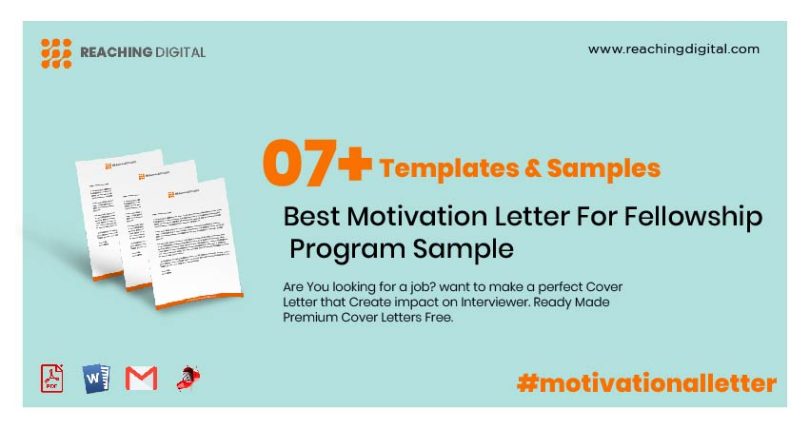
In the realm of fierce competition for fellowship programs, your ticket to success is a compelling motivation letter – a unique narrative that weaves your passion, skills, and aspirations into a story that demands attention. Ever wondered how to craft the perfect pitch for that coveted fellowship? Brace yourself, as we unravel the art of writing a Motivation Letter for a Fellowship Program – a blueprint for standing out amidst a sea of applications.
Picture this: your words become a symphony that resonates with the selectors, creating an indelible mark. This blog post dives deep into the nuances of crafting a motivation letter that doesn’t merely narrate but captivates, leaving an impression that lasts. Join us on this journey as we decode the elements that elevate a mere application to a compelling narrative.
Ready to embark on a transformational writing expedition? Let’s infuse life into your motivation letter and pave the way for your fellowship dreams to materialize. Craft your story, captivate your audience, and watch your aspirations unfold. The power is in your words – unleash it!
Table of Contents
Key Components of a Strong Motivation Letter For Fellowship Program
- Compelling Introduction: Begin with a gripping opening that sparks interest, setting the tone for an engaging narrative.
- Personalized Storytelling: Craft a unique story intertwining your experiences, aspirations, and skills to create a memorable impression.
- Alignment with Fellowship Goals: Demonstrate a clear understanding of the fellowship’s objectives and illustrate how your journey aligns seamlessly.
- Showcasing Achievements: Highlight specific accomplishments, emphasizing how they uniquely position you for success in the fellowship.
- Future Impact Statement: Conclude by outlining the positive impact you aim to make through the fellowship, showcasing your vision and commitment.
- Best Motivation Letter For Graduate Program: 7 Sample
- Motivation Letter for Cultural Exchange Program: 05+ Samples
- Catchy Motivation Letter For Exchange Program: 7 Examples
Motivation Letter For Fellowship Program:
Motivation letter for fellowship program sample:, fellowship motivation letter:, motivation letter for research fellowship:.
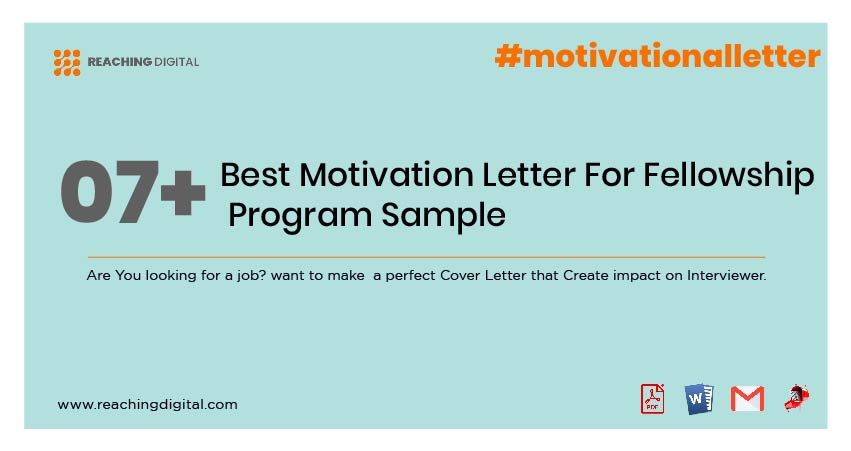
Best Motivation Letter For Postdoctoral Fellowship:
- Catchy Motivation Letter for Postdoctoral Research: 09 + Examples
- Best Motivation Letter For Postdoctoral Position: 5+ Example
- Great Motivation Letter for Doctors: 05+ Examples
Motivation Letter For Fellowship Application:
Short motivation letter for fellowship program:, motivation letter for fellowship program example:, motivation letter for fellowship program template:, sample motivation letter for fellowship program:.
- Unique Motivation Letter For PHD In Management: 7+ Examples
- Professional Motivation Letter For PHD In Marketing: 9+ Ideas
- 7+ Motivation Letter For PHD In Medicine Samples
Do’s and Don’ts of writing an impactful Motivation Letter For Fellowship Program
Do’s:
- Tailor Your Story: Craft a personalized narrative that reflects your unique journey, aligning it with the fellowship’s goals.
- Showcase Passion and Purpose: Convey genuine enthusiasm for the fellowship’s theme, illustrating how your passion drives a purposeful commitment.
- Align with Fellowship Objectives: Clearly articulate how your skills and aspirations align seamlessly with the specific objectives of the fellowship program.
Don’ts:
- Avoid Generic Phrases: Steer clear of overused phrases; instead, focus on authentic language that genuinely represents your voice and aspirations.
- Skip the One-Size-Fits-All Approach: Resist the temptation to use a generic template. Tailor each motivation letter to the specific fellowship, showcasing your genuine interest.
- Don’t Oversell or Undersell: Maintain a delicate balance; avoid exaggerated claims, while also ensuring you don’t downplay your achievements. Be honest and authentic.
Final Thoughts:
In the intricate dance of job applications, a well-crafted motivation letter is your spotlight moment, your chance to shine amidst a sea of candidates. Throughout this journey, we’ve uncovered the art of writing a compelling Motivation Letter for a Fellowship Program, emphasizing the need for a personalized touch that resonates with potential employers or decision-makers. Remember, it’s not just about stating qualifications; it’s about creating a narrative that captures attention and persuades.
Tailoring your story, showcasing genuine passion, and aligning with the specific objectives of the fellowship are the keys to unlocking the doors of opportunity. Your motivation letter is not just a piece of paper; it’s your voice in a crowded room, echoing your commitment and aspirations. So, as you embark on your writing expedition, let authenticity be your guide. Craft a letter that not only impresses but genuinely reflects who you are and what you bring to the table.
In this competitive landscape, where every word counts, your motivation letter can be the game-changer. As you take this newfound knowledge, dare to be bold, dare to be authentic, and most importantly, dare to stand out. Revise your motivation letter with these insights, and watch as your dreams take flight. Your story is waiting to be told – make it unforgettable.
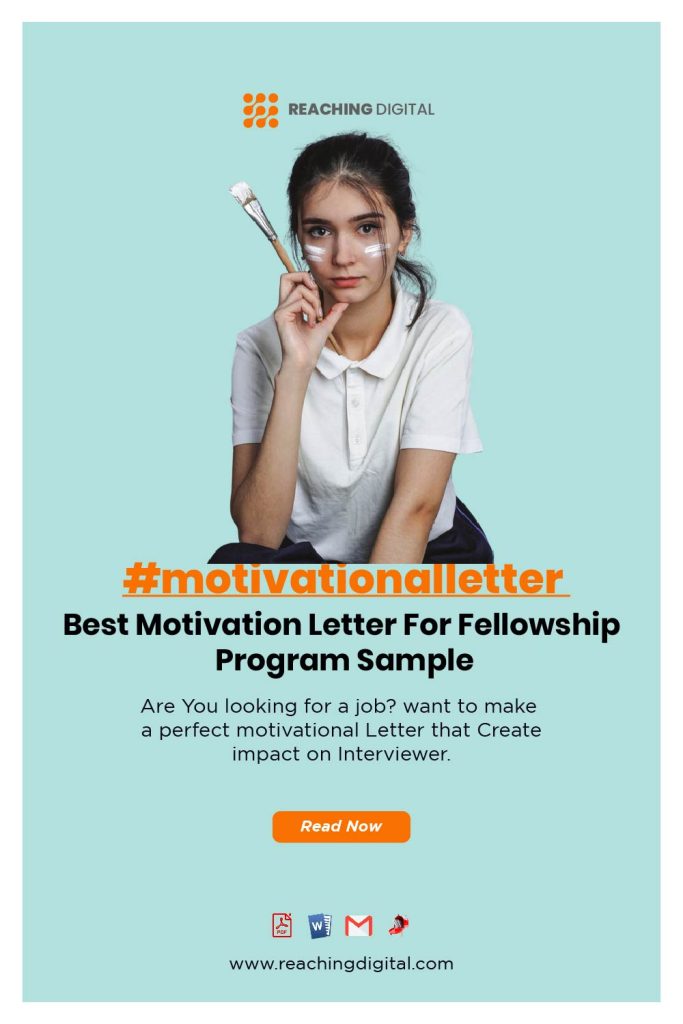
You may also like
The benefits of a motivational letter: examples and....

Motivation Letter For PHD In Electrical Engineering:...

Motivation Letter For PHD In Environmental Sciences:...
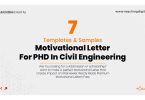
Motivational Letter For PHD In Civil Engineering : 7+...

Motivational Letter For PHD In Mechanical Engineering...

Motivation Letter For PHD In Anthropology: 7+ [Free...
About the author.
Jessica William
Leave a comment x.
Save my name, email, and website in this browser for the next time I comment.
- Undergraduate Students
- Masters Students
- PhD/Doctoral Students
- Postdoctoral Scholars
- Faculty & Staff
- Families & Supporters
- Prospective Students
- Explore Your Interests / Self-Assessment
- Build your Network / LinkedIn
- Search for a Job / Internship
- Create a Resume / Cover Letter
- Prepare for an Interview
- Negotiate an Offer
- Prepare for Graduate School
- Find Funding Opportunities
- Prepare for the Academic Job Market (PhD Students Only)
- Search for a Job or Internship
- Advertising, Marketing, and Public Relations
- Arts & Entertainment
- Consulting & Financial Services
- Engineering & Technology
- Government, Law & Policy
- Hospitality
- Management & Human Resources
- Non-Profit, Social Justice & Education
- Retail & Consumer Services
- BIPOC Students & Scholars
- Disabled Students & Scholars
- First-Generation Students & Scholars
- Former Foster Youth
- Formerly Incarcerated Students & Scholars
- International Students & Scholars
- LGBTQ+ Students & Scholars
- Students & Scholars with Dependents
- Transfer Students
- Undocumented Students & Scholars
- Women-Identifying Students & Scholars
Oak Ridge Institute for Science and Education
Cdc postdoctoral fellowship for strengthening vaccination campaign quality through monitoring and evaluation.
- Share This: Share CDC Postdoctoral Fellowship for Strengthening Vaccination Campaign Quality Through Monitoring and Evaluation on Facebook Share CDC Postdoctoral Fellowship for Strengthening Vaccination Campaign Quality Through Monitoring and Evaluation on LinkedIn Share CDC Postdoctoral Fellowship for Strengthening Vaccination Campaign Quality Through Monitoring and Evaluation on X
Description
*Applications will be reviewed on a rolling-basis.
CDC Office and Location : An opportunity is currently available with the Global Health Center (GHC) within the Global Immunization Division (GID) at the Centers for Disease Control and Prevention (CDC) located in Atlanta, Georgia.
The Centers for Disease Control and Prevention (CDC) is one of the major operation components of the Department of Health and Human Services. CDC works to protect America from health, safety and security threats, both foreign and in the U.S. Whether diseases start at home or abroad, are chronic or acute, curable or preventable, human error or deliberate attack, CDC fights disease and supports communities and citizens to do the same.
Research Project: The cholera and typhoid vaccine team within the Global Immunization Division (GID) at the Centers for Disease Control and Prevention works towards preventing cholera and typhoid morbidity and mortality through the effective and equitable use of oral cholera vaccine (OCV) and typhoid-conjugate vaccine (TCV) through building partnerships and in-country capacity to generate and use evidence to support data-driven decisions.
Oral cholera vaccines are delivered through campaigns to help build up immunity to prevent outbreaks or to help control outbreaks. Thus, achieving high quality campaigns (defined as having high coverage [>70%] and appropriate targeting) is essential for the campaigns to impact disease. Several other vaccine antigens are also routinely delivered through campaigns and are strongly supported by GID, specifically measles, rubella, and polio. This project aims to compile and review the current campaign quality indicators and strategies from across multiple vaccine antigens to provide lessons learnt and inform strengthening OCV campaign implementation and monitoring. The trainee will also support the team to pilot and evaluate several tools to facilitate OCV campaign planning and evaluation at the country level.
Learning Objectives : The trainee will gain a detailed understanding of the components of vaccine campaign implementation, including the challenges, limitations, and impact on the routine immunization system. They will have the opportunity to design, implement, and analyze the pilot studies. The placement would allow the trainee to gain experience collaborating with international Public Health partners and Ministries of Health and experience implementing projects and campaigns internationally. The trainee will be encouraged to present their findings through presentations within CDC and more broadly and published manuscripts.
Mentor(s): The mentor(s) for this opportunity is Lucy Breakwell ( xdc3 @cdc.gov ). If you have questions about the nature of the research please contact the mentor(s).
Anticipated Appointment Start Date: April 2024. Start date is flexible and will depend on a variety of factors.
Appointment Length: The appointment will initially be for one year, but may be renewed upon recommendation of CDC and is contingent on the availability of funds.
Level of Participation: The appointment is full-time.
Participant Stipend: The participant will receive a monthly stipend commensurate with educational level and experience.
Citizenship Requirements: This opportunity is available to U.S. citizens and Lawful Permanent Residents (LPR).
ORISE Information: This program, administered by ORAU through its contract with the U.S. Department of Energy (DOE) to manage the Oak Ridge Institute for Science and Education (ORISE), was established through an interagency agreement between DOE and CDC. Participants do not become employees of CDC, DOE or the program administrator, and there are no employment-related benefits. Proof of health insurance is required for participation in this program. Health insurance can be obtained through ORISE.
The successful applicant(s) will be required to comply with Environmental, Safety and Health (ES&H) requirements of the hosting facility, including but not limited to, COVID-19 requirements (e.g. facial covering, physical distancing, testing, vaccination).
Questions: Please visit our Program Website . After reading, if you have additional questions about the application process please email [email protected] and include the reference code for this opportunity.
Qualifications
The qualified candidate should have received a doctoral or master’s degree in one of the relevant fields (e.g. Public Health, Epidemiology). Degree must have been received within five years of the appointment start date or be currently pursuing.
Eligibility Requirements
- Citizenship: LPR or U.S. Citizen
- Degree: Master’s Degree or Doctoral Degree received within the last 60 months or currently pursuing.
Description
Prof. Jure Leskovec is inviting applications for a research position of Postdoctoral Scholar in the Leskovec Lab . The group is one of the leading centers for applied machine learning. Our research focuses on modeling complex interconnected systems from biomedical, information, and social domains. For this position, we are looking for researchers that will contribute to our research on foundation models for biology. The goal is to develop an AI-powered virtual cell modeling system that will lead to breakthroughs in the understanding of diseases. The overarching objective is to create open access tools that enable researchers to reach meaningful conclusions quickly thus speeding up the pace of scientific discovery.
Qualifications
How to apply.
- the specific areas you want to work on,
- how they fit with research in our group,
- how they build upon your previous work, and
- your preferred start date;
- Your current CV with research background and a list of your publications;
- Copies of your two representative publications.
- Arrange for two letters of reference from your previous research supervisors and collaborators to be sent directly to [email protected] within two weeks of submitting your application.
Several positions are available. The review of applications will begin immediately and will continue until the positions are filled.
About Stanford University
Stanford, one of the world's top universities, is located on a beautiful campus in the San Francisco Bay Area. Stanford has long been a magnet for talent in computing, and is considered the birthplace and spiritual center of Silicon Valley, an unparalleled center of technological and scientific innovation.
Stanford University is an affirmative action and equal opportunity employer, committed to increasing the diversity of its workforce. It welcomes applications from women, members of minority groups, veterans, persons with disabilities, and others who would bring additional dimensions to the university's research and teaching mission.
- Undergraduate Students
- Graduate Students
- Prospective Students
- Faculty/Staff
- Parents/Families
- Employers & Industry Connections
- Students of Color/BIPOC
- First Generation/Low Income
- International
- LGBTQ+ Community
- Students With Disabilities &/ Neurodiversity
- Exploring Careers & Interests
- Student Employment/FWS
- Resumes, CVs, & Cover Letters
- Internships & Jobs
- Interviewing
- Networking & Informational Interviews
- Career Fairs
- Negotiating an Offer
- Preparing for Graduate or Professional School
- Exploring Options
- Arts, Entertainment, & Media
- Business, Consulting, & Entrepreneurship
- Communication & Marketing
- Education, Academia, & Non-profits
- Engineering & Technology
- Environment, Energy, & Sustainability
- Law, International Relations, & Public Service
- Health & Medical Professions
- Life Sciences, Biotech, & Pharma
- Manufacturing, Logistics, & Transportation
- St. Petersburg
- Sarasota-Manatee
- Recruit at USF
- Meet the Teams
Oak Ridge Institute for Science and Education
Usda-ars postdoctoral fellowship in plant-microbe interactions.
- Share This: Share USDA-ARS Postdoctoral Fellowship in Plant-Microbe Interactions on Facebook Share USDA-ARS Postdoctoral Fellowship in Plant-Microbe Interactions on LinkedIn Share USDA-ARS Postdoctoral Fellowship in Plant-Microbe Interactions on X
*Applications are reviewed on a rolling-basis.
ARS Office/Lab and Location: A research opportunity is available with the National Laboratory for Agriculture and The Environment (NLAE) within the U.S. Department of Agriculture (USDA), Agricultural Research Service (ARS) located in Ames, Iowa.
The Agricultural Research Service (ARS) is the U.S. Department of Agriculture’s chief scientific in-house research agency with a mission to find solutions to agricultural problems that affect Americans every day from field to table. ARS will deliver cutting-edge, scientific tools and innovative solutions for American farmers, producers, industry, and communities to support the nourishment and well-being of all people; sustain our nation’s agroecosystems and natural resources; and ensure the economic competitiveness and excellence of our agriculture. The vision of the agency is to provide global leadership in agricultural discoveries through scientific excellence.
The NLAE is a transdisciplinary lab whose mission is to generate information addressing critical problems in agriculture and watershed management to develop innovative solutions which increase the efficiency of agriculture systems and reduce environmental risk.
Research Project: A postdoctoral fellowship is available for enthusiastic and self-directed applicants. Under the guidance of a mentor, the research fellow will identify and evaluate plant traits that impact nitrogen cycling in the rhizosphere and detritosphere of maize. The aim of this research is to:
- Identify and develop novel sources of biological nitrification inhibition (BNI) capacity in maize and
- Evaluate the contribution of plant chemistry and root and rhizosphere traits, including BNI, to agroecosystem nitrogen use efficiency, nitrogen retention and reductions in nitrous oxide emissions.
The research will be part of a collaborative project with an interdisciplinary team of government, university, and industry scientists within the Circular Economy that Reimagines Corn Agriculture (CERCA) project. The vision of CERCA is to transform US grain farmland into a net-greenhouse gas negative component of a circular bioeconomy through earlier planting and increased uptake, recycling and retention of nitrogen and phosphorous. Translational research teams are pursuing three main objectives: (1) Modeling plants, farms, environments, and economics to identify trait combinations and US environments likely to benefit from the new cropping system; (2) trait discovery through testing wild species and diverse maize germplasm with promising cold tolerance and nutrient recycling and retention capabilities; and (3) trait development through stacking genetic improvements.
Learning Objectives: In collaboration with the mentor and team scientists, the successful applicant will have the opportunity to define personal research objectives to support the efforts of trait discovery and evaluation in relation to plant-microbe interactions, agroecosystem nitrogen retention and mitigation of nitrous oxide emissions. Under the guidance of a mentor, the participant will design experiments and conduct personal and team research on plant traits influencing microbial communities and nitrogen cycling in the rhizosphere and detritosphere in maize hybrids and wild relatives. The participant will have the opportunity to develop their knowledge in the fields of rhizosphere ecology, molecular microbial ecology, and agroecology and gain skills in the characterization and quantification of nitrogen cycling communities, measurement of ecosystem process rates and the culture and handling of nitrifiers. The participant will have the opportunity for close collaboration and learning with a team of geneticists, breeders, soil scientists, agroecologists and bioinformaticians.
Mentor(s): The mentor for this opportunity is Bryan Emmett ( [email protected] ). If you have questions about the nature of the research, please contact the mentor(s).
Anticipated Appointment Start Date: May 2024. Start date is flexible and will depend on a variety of factors.
Appointment Length: The appointment will initially be for two years, but may be renewed upon recommendation of ARS and is contingent on the availability of funds.
Level of Participation: The appointment is full time.
Participant Stipend: The participant will receive a monthly stipend commensurate with educational level and experience. Full or partial health insurance reimbursement may be provided along with the stipend.
Citizenship Requirements: This opportunity is available to U.S. citizens, Lawful Permanent Residents (LPR), and foreign nationals. Non-U.S. citizen applicants should refer to the Guidelines for Non-U.S. Citizens Details page of the program website for information about the valid immigration statuses that are acceptable for program participation.
ORISE Information: This program, administered by ORAU through its contract with the U.S. Department of Energy (DOE) to manage the Oak Ridge Institute for Science and Education (ORISE), was established through an interagency agreement between DOE and ARS. Participants do not become employees of USDA, ARS, DOE or the program administrator, and there are no employment-related benefits. Proof of health insurance is required for participation in this program. Health insurance can be obtained through ORISE.
Questions: Please visit our Program Website . After reading, if you have additional questions about the application process, please email [email protected] and include the reference code for this opportunity.
Qualifications
The qualified candidate should be currently pursuing or have received a doctoral degree in the one of the relevant fields (e.g. microbial ecology, soil biogeochemistry, plant-microbe interactions). Degree must have been received within the past five years or anticipated to be received by or near the agreed upon start date.
Depending on the research project objectives, the selected candidate may need to operate a government owned vehicle (GOV) and will be required to show proof of a valid U.S. State Driver’s License and provide proof of an active U.S. auto insurance policy.
Preferred skills:
- Excellent written and oral communication skills and evidence of successful publication in peer-reviewed journals
- Ability to research independently and within a team
- Preference will be given to candidates who have experience with nitrogen cycling microbial communities, handling of bacterial cultures and rhizosphere ecology.
Eligibility Requirements
- Degree: Doctoral Degree received within the last 60 months or currently pursuing.
- Skip to main menu
- Skip to user menu
Moon Family Postdoctoral Fellowship, 2024-25

- Cover Letter (including a description of research projects to be carried out during the fellowship, and teaching interests/experiences)
- Writing Sample (a published/publishable article or a dissertation chapter)
- One course syllabus
- Two Letters of Recommendation (uploaded to the Interfolio directly by the recommenders) The application must be submitted by 5 p.m. EST on Feb. 28, 2024. Award decisions will be made by early April 2024. Our Center values interdisciplinary research, collaboration, and collegiality; is committed to promoting a culturally diverse intellectual community; and strongly encourages applications from women, minorities, and underrepresented communities. The University of Pennsylvania does not discriminate on the basis of race, color, sex, sexual orientation, gender identity, religion, creed, national or ethnic origin, citizenship status, age, disability, veteran status or any other legally protected class status in the administration of its admissions, financial aid, educational or athletic programs, or other University-administered programs or in its employment practices. Questions or concerns about this should be directed to the Executive Director of the Office of Affirmative Action and Equal Opportunity Programs, University of Pennsylvania, 421 Franklin Building, 3451 Walnut Street, Philadelphia, PA 19104-6205; or (215) 898-6993 (Voice) or (215) 898-7803 (TDD). Questions can be directed to: Seok Lee, Associate Director of Academics Email: [email protected] Qualifications Application Instructions To apply, visit https://apply.interfolio.com/137370 The University of Pennsylvania values diversity and seeks talented students, faculty and staff from diverse backgrounds. The University of Pennsylvania is an equal opportunity and affirmative action employer. Candidates are considered for employment without regard to race, color, sex, sexual orientation, gender identity, religion, creed, national or ethnic origin, citizenship status, age, disability, veteran status or any other legally protected class. Questions or concerns about this should be directed to the Executive Director of the Office of Affirmative Action and Equal Opportunity Programs, University of Pennsylvania, 421 Franklin Building, 3451 Walnut Street, Philadelphia, PA 19104-6205; or (215) 898-6993 (Voice) or (215) 898-7803 (TDD). jeid-88e3154f91b5934282ed06e64aa0382d
Share this job
Get job alerts
Create a job alert and receive personalized job recommendations straight to your inbox.
Similar jobs
Psychology, department chair and professor, tenure-track.
- Chicago, Illinois, United States
Lab Research Associate Soil Health and Environmental Quality
- Frankfort, Kentucky, United States
State Specialist in Livestock Production

IMAGES
VIDEO
COMMENTS
3. Write your introduction. Use your beginning paragraph to explain why you are writing the cover letter. Refer to the position you're applying to and explain where you heard about the opportunity. If you have a personal connection who works with the PI, job poster or hiring manager, you can mention them here.
This postdoc cover letter sample comes from Sam, who is due to complete his PhD in 2023, and is applying for a research position. Let's see how he presents his arguments. Save hours of work and get a cover letter like this. Pick a template, fill it in. Quick and easy. Choose from 18+ cover letter templates and download your cover letter now.
research patents. Only list one or two relevant and high-profile publications in your cover letter. Your complete list of publications belongs in your academic CV. 3. Describe how you uniquely fit the position. To connect your skills and expertise to the target position, propose a project you could do if hired.
Here are some guidelines to create the first paragraph of your postdoc cover letter: Greet the recruiter with Dear Mr./Ms. XYZ. State your interest in the advertised postdoc position. Spark the interest of the recruiter with your most relevant experience and accomplishments.
Here's how to write a postdoc cover letter: 1. Use the proper postdoc cover letter format. Use 1" cover letter margins on all sides. Choose single or 1.15 line spacing. Use a professional cover letter font in 12pt size. Read more: The Best Covering Letter Layout. 2. Create a professional postdoc cover letter header.
that you lay out the 'backbone' of your CV first, by. picking 3-8 section headings that reflect the scope of your work. Then, begin writing/cutting and pasting your information into those sections. Then keep trying to fill out each section by fleshing out the descriptive text of each of your experiences. Write in 20-60 minute bursts.
A cover letter starts like a formal letter with the date at the top followed by the name and work address of the job poster. This is followed by the salutation. For a postdoc position, you will often be addressing your letter to the PI. However, if it is not clear from the advertisement who the job poster is, you can always address the letter ...
A postdoctoral cover letter helps to express your enthusiasm and passion for continuing further research in your preferred field of study. When applying for a postdoc position, the cover letter helps to distinguish your profile from other eligible candidates and highlights your suitability for the role. Knowing how to write an engaging cover ...
With 125+ cover letter examples and occupation-specific writing guides, Resume.io is here to make an impressive postdoc cover letter easier than you think. This guide, along with our postdoc cover letter examples, will cover these topics: The best format for structuring a postdoc cover letter. How each cover letter section speaks to your ...
If you are sending an unsolicited postdoc application, show willingness to discuss potential funding opportunities and apply for independent postdoctoral fellowships. We suggest preparing to write your cover letter by: 1. Reading several examples of cover-letters for positions at the same level / field as you. 2.
End your cover letter with the same professionalism you used at the opening. Thank the PI for his or her time and consideration. Be sure to provide your contact information and state that you look forward to hearing from him or her. Everything discussed above should fit onto a single page — 1 ½ pages at most.
Examples to avoid are: "Hope you are safe or healthy, I want to apply for this position, I'm interested in doing PhD/postdoc in your lab". These are not formal. "Dear Prof. x. OR Dear committee ...
cover letters, whether you are applying for an academic position or a non-academic position - or both. It is designed primarily for Cambridge PhD students and postdoctoral staff. Undergraduates and Masters students should ask for the edition of CVs and Cover Letters written especially for them, available free from the Careers Service. Each ...
When writing a postdoc cover letter, these are some of the essential things to include in your letter: Address the employer with a formal salutation. For example, "Dear/Hello (name of the recipient or hiring manager).". The next step is to state the position you are applying for and how you found the opening.
FELLOWSHIPS AND AWARDS . Warren Center Dissertation Completion Fellowship, Harvard University, 2018-19 Graduate School of Arts and Sciences Merit/Term-Time Fellowship, Harvard University, 2017-18 Rockefeller Archive Center Grant-in-Aid, 2017-18 Taubman Center for State & Local Government Research Award, Harvard Kennedy School, 2017-18, 2016-17
Most fellowship and grant applications require a research proposal and personal statement; few ask you to write a cover letter. Still, there are some dissertation and postdoctoral fellowship applications where knowing how to write a strong cover letter can come in handy (take the Consortium for Faculty Diversity Dissertation Fellowship, for example).
Letter 2: Teaching-focused. Dear [Supervisor's Name], I am writing to express my interest in the postdoctoral teaching fellowship at [Research Institution]. As a recent Ph.D. graduate in [Field] from [University], I am excited about the opportunity to contribute to the teaching and mentorship of undergraduate students in [Field].
Finding a Postdoc; Cornell Postdoctoral Fellowship Programs; Office of Postdoctoral Studies. Postdoc Careers. Academic Job Search. Letters. ... Encourage employers to interview you by reading your cover letter and resume. Sample Letter of Application. 321 Linden Avenue Ithaca, New York 14850 January 10, 2010.
September - December: Write Your Cover Letters. Most applications will require you to submit a cover letter, CV, 2-4 letters of recommendation, and your graduate transcripts. Postdoc cover letters should be tailored to that site's specific emphasis, and the cover letter should align with your CV and letters of recommendation.
Cover letter: Include a statement (1-page maximum) on why this program is a good fit for you and how your identity and/or background has informed your pathway. Include which area of engineering you wish to work. ... Make sure to select the 1:30 pm session for the Postdoctoral Fellowship Program for Engineering Excellence. December 11, 2023 from ...
Key Components of a Strong Motivation Letter for Postdoctoral Research . Unveil Your Academic Odyssey: Share a concise yet compelling narrative of your academic journey, showcasing milestones, challenges, and the intellectual evolution that positions you as a postdoctoral candidate. Align with Institutional Goals: Demonstrate a keen understanding of the prospective institution's research ...
Motivation Letter For Fellowship Program Template: Dear [Selection Committee], I am thrilled to apply for the Fellowship Program, inspired by my dedication to [Fellowship Theme]. As a [Your Field] professional, I have tailored my experiences to align seamlessly with the program's objectives. Enclosed is a template of my journey, showcasing my ...
their J-1 Visa during the entire two-year period. The Admission Letter must be signed by aTenure or Tenure-Track Faculty member that is willing to serve as the supervisor for the applicant. If the supervisor has a Tenure-Track Faculty appointment, the term of the appointment must be enough to cover the two years of the Postdoctoral Fellowship.
Description *Applications will be reviewed on a rolling-basis. CDC Office and Location: An opportunity is currently available with the Global Health Center (GHC) within the Global Immunization Division (GID) at the Centers for Disease Control and Prevention (CDC) located in Atlanta, Georgia.. The Centers for Disease Control and Prevention (CDC) is one of the major operation components of the ...
To apply, please send us your application and reference letters: Copies of your two representative publications. Submit the application via email to [email protected], under the subject line "Postdoctoral Fellowship Application". We encourage you to also include links to any software that you have developed.
*Applications are reviewed on a rolling-basis. ARS Office/Lab and Location: A research opportunity is available with the National Laboratory for Agriculture and The Environment (NLAE) within the U.S. Department of Agriculture (USDA), Agricultural Research Service (ARS) located in Ames, Iowa. The Agricultural Research Service (ARS) is the U.S. Department of Agriculture's chief scientific in ...
The fellowship will cover the 12-month period between August 1, 2024 and July 31, 2025 and provide a stipend of $65,000 as well as conference travel funds up to $2,000. The Kim Center will cover the cost of the fellow's health insurance (including medical, dental, vision, and life).
The Center for Global Asia at NYU Shanghai is pleased to announce the availability of two research positions for the study of intra-Asian interactions, starting fall 2024. One position is for a postdoctoral fellow working on colonial or pre-colonial (c. 1400-1800) port cities of the Indian Ocean world, including the South China Sea.